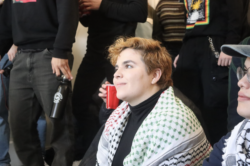The Georgetown Law Center recently acquired $2.4 million from a man who had no previous affiliation with the law school. Attorney Philip Friedman of Friedman Law Offices PLLC in Washington, D.C. donated the money to the Institute for Public Representation, a Law Center clinical program, after his firm won a class action lawsuit against the cable television network Comcast. The company was indicted for overcharging D.C. customers for late cable payments.
Some of the money the Law Center received was a result of the fact that some of the 100,000 plaintiffs in the case failed to collect their rewards. The uncollected funds, totaling approximately $9 million, had to be donated or they would have been returned to Comcast. Friedman said he would not allow the latter to happen.
“Our firm started a campaign, putting ads in newspapers and commercials on TV, but not a lot of people take advantage of it,” he said. “But I was not going to allow Comcast to get money back that they had wrongfully taken. What was the next best use? To fund legal aid clinics in the District where consumers live and could benefit from interest in consumer protection.”
Friedman explained that even after his firm won the lawsuit against Comcast, he still needed to convince a D.C. Superior Court judge that donating the funds was indeed the best use of the money. According to Friedman, Comcast battled with him over the best recipients of the money, suggesting that the court give it to organizations with which Comcast had some sort of relationship.
“Comcast argued that other beneficiaries should have gotten the money-institutions with which it had some sort of pre-existing relationship or marketing tie such as the Partnership for a Drug Free America or United Way,” he said.
Judge Leonard Bramen of the D.C. Superior Court ultimately sided with Friedman’s arguments; the court ordered a quarter of the money be sent to the clinical program at the Law Center, with the rest to be divided among D.C. Law Students in Court, the Legal Counsel for the Elderly and George Washington University Law School’s Jacob Burns Community Legal Clinics.
Friedman said that when he wrote the brief to petition the court to give money to the Law Center, he named Georgetown as a prime donor instantaneously.
“I wanted to make sure that money stayed in the District of Columbia,” he said. “One of my first priorities was to make sure the institution given money had a stake in the citizens of the District. In my judgment, the Law Center has a major presence here, not only in education, but also using future lawyers to assist D.C. through clinical aid.”
Associate Dean Wallace Mlyniec, who leads Georgetown’s clinical programs, is thrilled with Friedman’s decision to support the Law Center.
“The really incredible story here is how a man who had no relation to Georgetown at all recognized us and realized how good our programs were,” he said.
According to Mlyniec, the $2.4 million will be put into an endowment to support the study of communications law at the Institute for Public Representation. IPR focuses on issues dealing with public access to the media and children’s programming rules governing the ways in which TV stations should serve public interests.
However, it seems that this new inflow of money will not alleviate any of the University’s financial woes. When sked if a portion of the donation would go to expedite the implementation of Georgetown’s recently approved Just Employment Policy or augment the endowment of the Georgetown School of Medicine, Mlyniec said that such uses were forbidden by the D.C. Superior Court.
“We can’t do that,” he said. “It would be illegal since the money is under strict orders from the court to be used for the clinical programs at the Law Center.”




